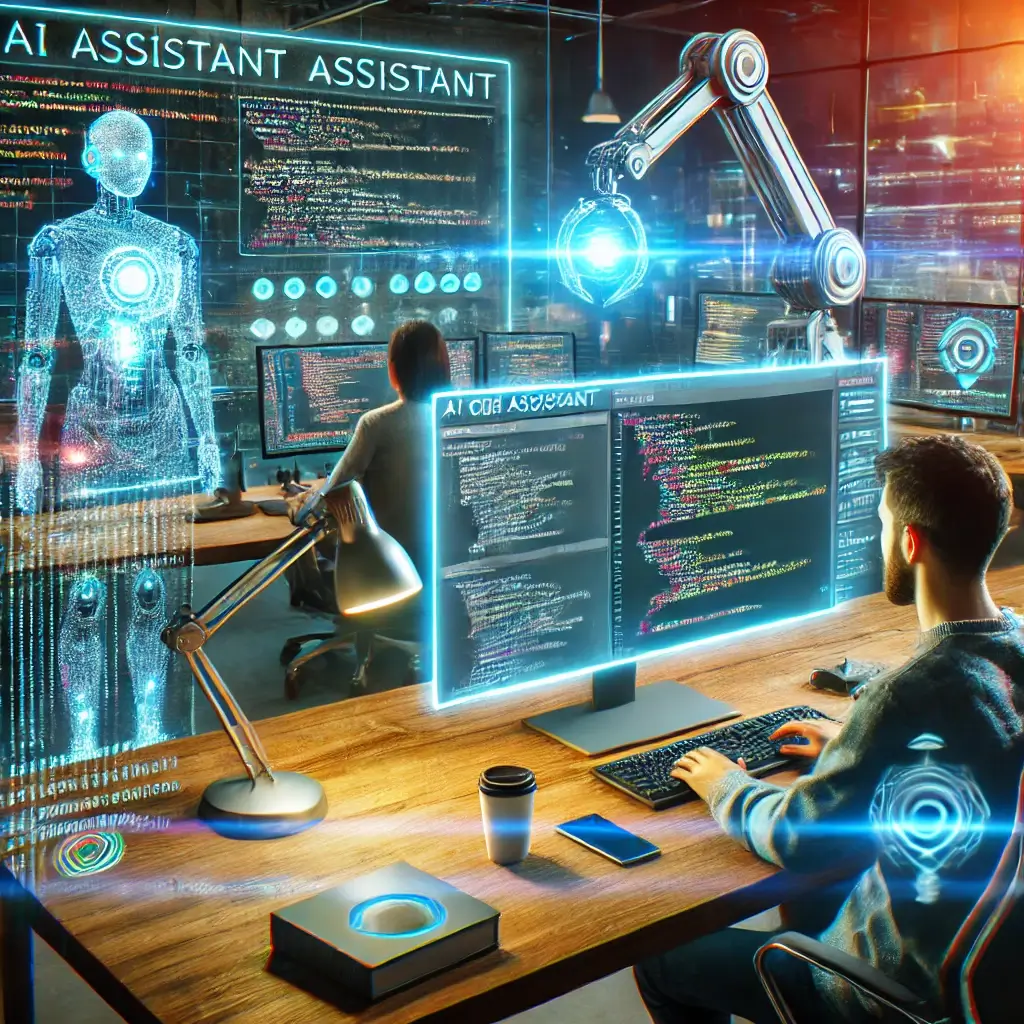-
How Digital Nomads Are Redefining Work and Lifestyle 🌍💻
Mar 06, 2025 | 39 Comments -
How Artificial Intelligence is Transforming Healthcare 🏥🤖
Mar 06, 2025 | 0 Comments -
How Cryptocurrency is Reshaping the Global Economy 💰🌍
Mar 06, 2025 | 0 Comments -
How to Build a Strong Personal Brand: Stand Out & Grow Your Influence 🚀📢
Mar 02, 2025 | 0 Comments -
The Power of AI in Business: How Artificial Intelligence is Transforming Industries 🚀🤖
Mar 02, 2025 | 0 Comments -
How Smart Homes Are Changing the Way We Live 🏡🔋
Mar 02, 2025 | 0 Comments -
How Electric Vehicles Are Revolutionizing Transportation 🚗⚡
Mar 02, 2025 | 0 Comments -
The Future of Renewable Energy: How Green Technology is Changing the World 🌍⚡
Mar 02, 2025 | 0 Comments

AI Code Assistants: Revolutionizing Software Development
Artificial Intelligence (AI) has permeated various industries, and software development is no exception. AI code assistants are emerging as transformative tools, enhancing coding efficiency, reducing errors, and accelerating project timelines.
What Are AI Code Assistants?
AI code assistants are advanced tools that leverage machine learning and natural language processing to aid developers in writing code. They can suggest code snippets, detect bugs, and even generate entire code blocks based on the developer's intent. By understanding patterns and context, these tools reduce repetitive tasks, freeing developers to focus on more complex challenges.
Benefits of AI Code Assistants
Integrating AI code assistants into the development process offers several advantages:
- Enhanced Productivity: By providing real-time code suggestions, developers can write code faster and with greater accuracy. These tools act as virtual teammates, streamlining workflows and reducing manual coding time.
- Error Reduction: AI assistants can identify potential bugs and vulnerabilities, ensuring more robust and secure code. Their ability to perform automated testing and code reviews adds an additional layer of quality assurance.
- Learning Support: For novice developers, these tools serve as educational aids, offering insights into best practices and coding standards. By providing instant feedback, they help developers improve their skills over time.
- Cost Efficiency: Reducing errors and expediting the development process ultimately lowers costs, particularly in large-scale projects.
Popular AI Code Assistants
Several AI code assistants have gained prominence in the developer community:
- GitHub Copilot: Developed by GitHub in collaboration with OpenAI, Copilot suggests entire lines or blocks of code based on the current context. It supports multiple programming languages and integrates seamlessly with Visual Studio Code.
- Codeium: A free AI-powered code completion tool that supports various programming languages. Its intuitive interface and accessibility make it a favorite among developers looking for budget-friendly options.
- Tabnine: An AI assistant that offers code completions using deep learning models. Its ability to adapt to a developer's unique style makes it a valuable tool for teams seeking personalized solutions.
- Kite: Known for its advanced autocompletion capabilities, Kite leverages AI to provide intelligent suggestions and documentation insights directly within code editors.
Challenges and Considerations
While AI code assistants offer numerous benefits, developers should be mindful of potential challenges:
- Overreliance: Depending too heavily on AI suggestions may hinder the development of problem-solving skills. Developers must strike a balance between leveraging AI and maintaining their own critical thinking abilities.
- Security Concerns: It's essential to review AI-generated code to ensure it doesn't introduce vulnerabilities. Developers should implement robust testing protocols to validate the integrity of suggestions.
- Intellectual Property: Developers should be cautious about the origin of AI-suggested code to avoid potential licensing issues. Awareness of copyright and usage policies is critical when using AI tools.
- Learning Curve: While these tools are designed to simplify coding, new users may require time to familiarize themselves with the interface and capabilities of each assistant.
The Future of AI in Software Development
The integration of AI in software development is still in its early stages. As these tools evolve, we can anticipate more sophisticated features, such as:
- Automated Code Refactoring: AI could assist in optimizing existing codebases for better performance. This would save significant time in maintaining legacy systems.
- Natural Language Queries: Developers might interact with codebases using conversational language, making code navigation and understanding more intuitive.
- Advanced Debugging: Future AI tools could not only detect bugs but also suggest comprehensive solutions, significantly reducing troubleshooting time.
- Cross-Platform Support: Enhanced compatibility with various frameworks and programming environments will make AI code assistants indispensable for developers working on diverse projects.
As these advancements materialize, the role of AI in software development will expand, fostering innovation and collaboration.
FAQs About AI Code Assistants
Q: Are AI code assistants suitable for all programming languages?
A: Most AI code assistants support multiple programming languages, including Python, JavaScript, Java, and C++. However, the level of support may vary depending on the tool and language.
Q: Do AI code assistants replace the need for human developers?
A: No, AI code assistants are designed to complement human developers, not replace them. They handle repetitive tasks and provide suggestions, but critical thinking and creativity remain essential for software development.
Q: How secure are AI-generated code suggestions?
A: The security of AI-generated code depends on the tool and the review process implemented by the developer. It is crucial to verify and test all code before deployment.
Q: Can AI code assistants be used in team settings?
A: Yes, many AI tools offer features that facilitate collaboration, such as shared suggestions and integration with version control systems.
0 comments
No comments yet. Be the first to comment!
Your comment